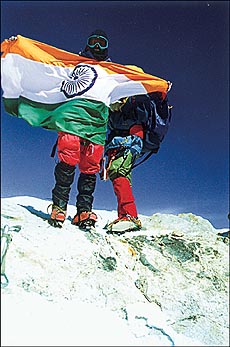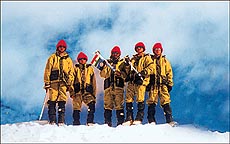Youngsters’ tryst with Leo Parigyal
By H. Kishie
Singh
IT is probably the youngest team
to reach the summit of Leo Parigyal, which at 22,219 feet
above sea level, is Himachal’s third highest peak.
The climb is technically very difficult with extreme
winds and low temperatures.
 Seven boys from Bishop Cotton School,
Shimla, accompanied by Rajiv Sharma, Chief Instructor,
Institute of Mountaineering and Allied Sport (IMAS),
Manali, scaled Leo Parigyal on June 21, 1999. Seven boys from Bishop Cotton School,
Shimla, accompanied by Rajiv Sharma, Chief Instructor,
Institute of Mountaineering and Allied Sport (IMAS),
Manali, scaled Leo Parigyal on June 21, 1999.
The school team was led
by Ranjit Dhaliwal and Suresh Thakur, both members of the
staff. The students were C. Yurgal, A.C. Bhandari, R.
Chauhan, A. Bodh, M.H. Khan, V. Negi, and V.S. Rathore,
who at 14 years of age could be one of the youngest
summiteers. The rest of the boys were all 16 years old.
Confirmation on this point is being sought from the IMF
— Indian Mountaineering Federation.
Said Sharma, the team
leader: "I first met the team when I came to BCS. I
had very good reports about the boys during their basic
training. My first interaction with them was at Nako.
Our camp was half a
kilometre from the bus stop. These boys moved the entire
baggage, tents, equipment, the rations in record time and
all on their backs. The boys were disciplined, obedient
and in good physical condition. I had full confidence in
them. I knew these boys would be successful."
"The most important
thing in the mountains", continued Sharma, "is
self-discipline. And these boys showed the true example
of this discipline."
The students were an
inspired lot. "We felt lucky and really proud to
represent our school. It was the first time the school
had such an expedition," said Bhandari.
None of the boys had any
previous mountaineering experience. They started basic
training in April this year and after three months of
vigorous training, they had climbed Leo Parigyal.
The highest point any of
these boys had climbed previously in the mountains was
about 15,000 feet and that too on a hike.
 The
expedition itself was an advanced course. For this the
IMAS supplied all the equipment and rations. It is a
tribute to the school team that they passed this test of
advanced mountaineering with flying colours and as a
result have been recommended for climbing any mountain
over 7000 metres. The
expedition itself was an advanced course. For this the
IMAS supplied all the equipment and rations. It is a
tribute to the school team that they passed this test of
advanced mountaineering with flying colours and as a
result have been recommended for climbing any mountain
over 7000 metres.
The most exciting and
most dangerous moment was when the team stood on the
summit. The snow can be fresh and soft or it can be
hard-packed and slippery. With the additional weight of
four to six climbers anything could happen.
Ranjit Dhaliwal, a
physical training instructor at BCS and a first time
summiteer, said: "Along the way I asked myself what
am I doing here? But when I stood on the summit we forgot
all hardships. It was a moment of great elation.
It’s hard to describe the feeling." All the
boys have shared the same feeling, the same hardships. It
has forged a strong bond of friendship.
The team left camp two
at 20,000 feet at 6.40 a.m. on June 21, and returned at
5:45 p.m., triumphant. The boys unfurled the National
Flag and the school flag atop Leo Parigyal. During the 11
gruelling and arduous hours, the team faced winds with a
velocity of over 150 kmph and temperature that was
-25°C.
"The temperature
was very severe," said Sharma "For the first
time in 22 years of climbing I got chilblains."
The Cottonians had
trained under Brig D.K. Khullar (retd.) who had led the
1983 Everest expedition in which Bachindri Pal reached
the summit. Said a mildly amused Brig Khullar,
"thirty years ago when I climbed Leo Parigyal it was
the highest mountain in Himachal. Things have
changed!" This mountain was largely ignored from
1937-1967 when no climbers attempted the peak. Since then
it has been a target of would-be mountaineers as it
provides a technical challenge and is easy to access. An
excellent road leads to Nako, the highest village in
Kinnaur which is used as a base camp for
acclimatisation.It is around 16,000 feet above sea level.
In his talk to the
Cottonians, Brigadier Khullar had this to say: "For
a nation to be great, it must live dangerously".
|

![]()

